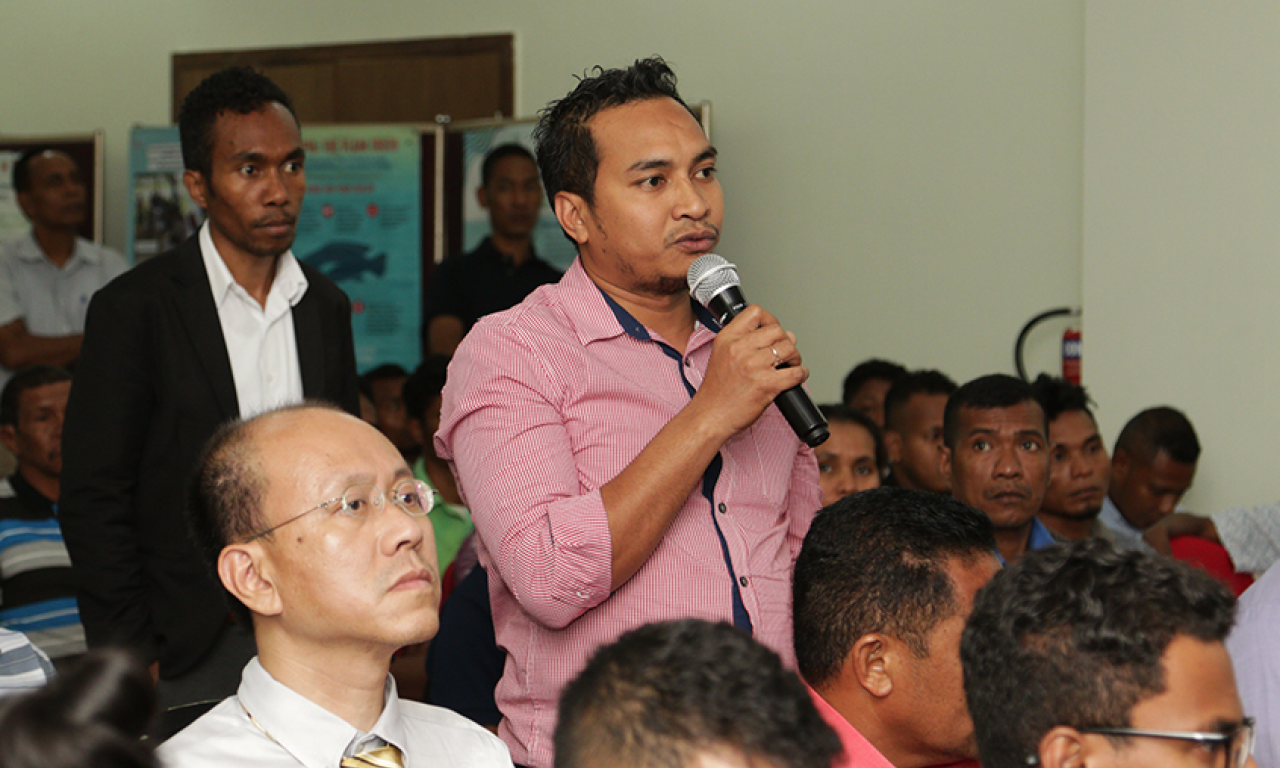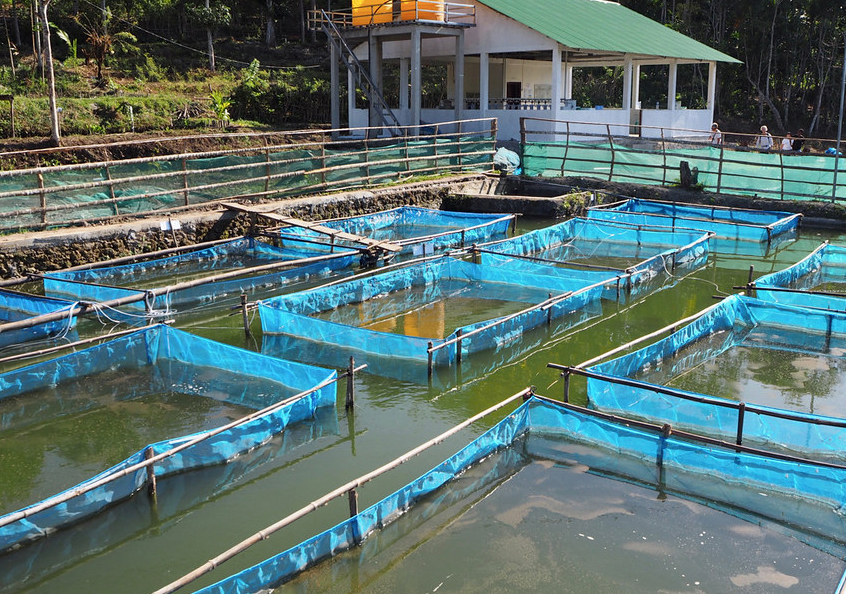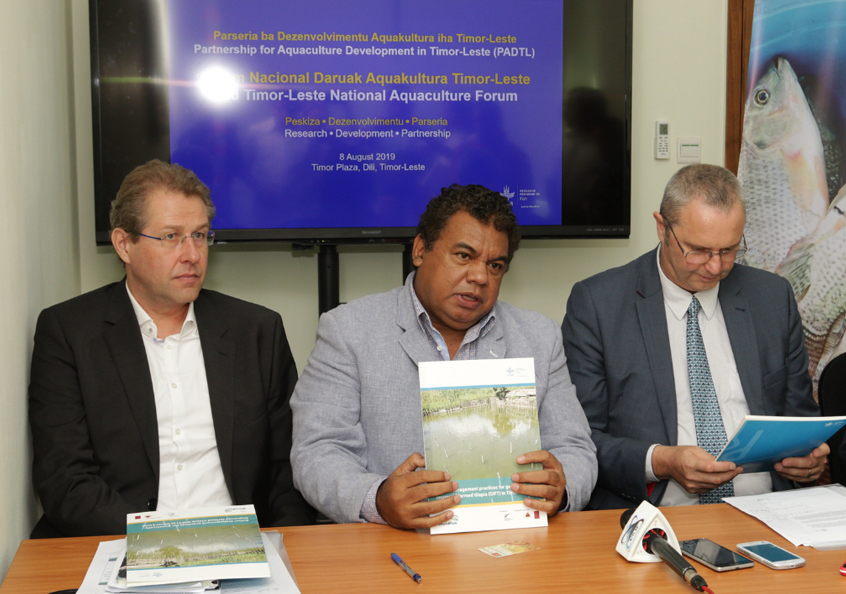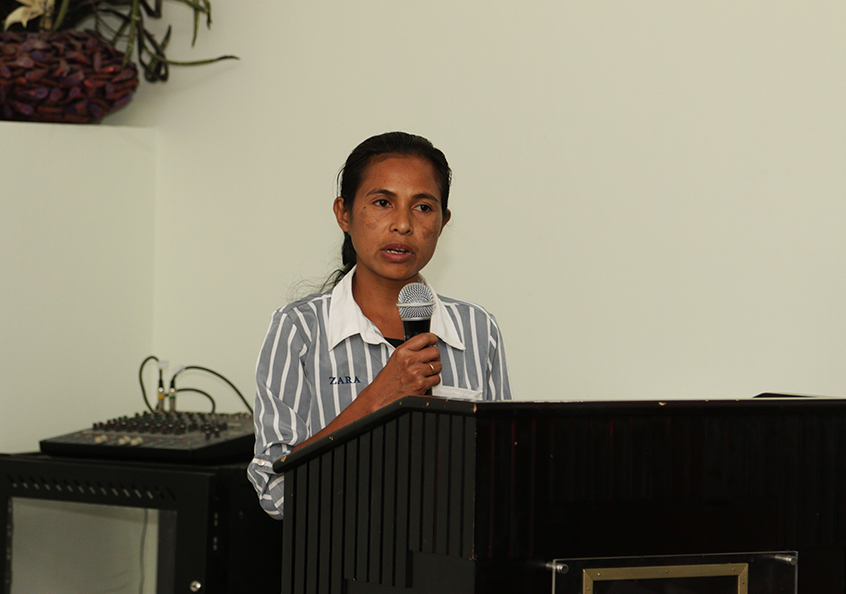
Over 100 public and private sector representatives came together recently in Timor-Leste, marking another step toward realizing the potential of fish farming in the country.
Over 100 public and private sector representatives came together recently in Timor-Leste, marking another step toward realizing the potential of fish farming in the country.
The Timor-Leste government, private sector and development partners have agreed to continue working together to boost access to and availability of farmed fish to combat poverty and malnutrition in the half-island nation.
The commitment, made at the 2nd National Aquaculture Forum in the capital Dili on 8 August 2019, is critical to realizing the government’s goal to increase fish production from only around 50 metric tons a year in 2009 to 12,000 metric tons per year by 2030.
Farmed fish for food and nutrition security
The New Zealand Ambassador to Timor-Leste, Philip Hewitt, delivered the keynote address, highlighting the launch of the country’s first private hatchery for Genetically Improved Farmed Tilapia (GIFT) in June 2019.
“The inauguration was a significant achievement for the sector,” said Hewitt of the hatchery in Leohitu, Bobonaro municipality.
The hatchery, developed under a public-private-partnership (PPP) model, will be run as a private business with the government and WorldFish to provide technical support. It was built as part of the Partnership for Aquaculture Development in Timor-Leste (PADTL) project (2014–2019) funded by New Zealand Aid.
“The hatchery provides an example of the potential of private sector investment in tilapia farming,” said Hewitt at the forum, held at Timor Plaza Hotel.

Identifying ways to foster partnerships was a key goal of the event, which brought together over 100 aquaculture stakeholders.
Hewitt urged the sector—including government, private sector, NGOs, farmers, communities and other partners—to better coordinate its efforts and share lessons learned to get the best development impact for communities.
It was a sentiment echoed by the event participants, who agreed on the need for aligned activities to expand the aquaculture sector and develop its value chains and markets.
GIFT BMP guidelines launched
The event, which followed the country’s first aquaculture forum in 2017, was organized by the PADTL project that is managed by the Timor-Leste Government in partnership with the CGIAR Research Program on Fish Agri-Food Systems (FISH) led by WorldFish.
The event supports progress toward the Timor-Leste National Aquaculture Development Strategy (2012–2030), which aims to increase fish consumption from 6.1 kg to 15 kg/person/year, and for aquaculture to provide up to 40 percent of domestic fish supplies by 2030.
In line with these targets, the Minister of Aquaculture and Fisheries, H.E. Joáquim José Gusmão dos Reis Martins, launched the Better Management Practices for GIFT in Timor-Leste (BMP Guidelines) at the forum.
“These practices will help farmers to achieve the best results from the fast-growing GIFT strain of tilapia.
“The guidelines, which are available in both Tetum and English, will be an important extension resource for government organizations and non-governmental organizations that train and provide support to fish farmers,” the minister said.

Developed by WorldFish and the Ministry of Agriculture and Fisheries, the BMP Guidelines detail a range of on-farm practices relating to pond design and management, seed selection, feed management, water quality, post-harvest handling and marketing.
Farmers who were producing 1.2 tons/ha/cycle have increased their fish productivity by following the BMP Guidelines. Now, many are producing 4.3 tons/ha/cycle and have the potential to produce up to 7.0 tons/ha/cycle or even more—a significant yield for Timorese farmers.
The practices were tested and validated by over 250 farmers in Timor-Leste between 2016–2018. This was through a group-based participatory approach, known as Farmer Field School, as part of the PADTL project.
‘A small country with big lessons’
At the forum, farmer representatives from Baucau, Bobonaro and Ermera municipalities, who have been involved with the PADTL project, expressed strong interest in expanding and intensifying their GIFT production and called for better feed, seed and market linkages.
“It’s often hard to get enough local ingredients for feed and to find a market to sell my surplus fish,” said Bobonaro fish farmer Juvita ana Gloria at the event.

Dr. Jharendu Pant, Senior Aquaculture Scientist and PADTL Project Leader, WorldFish, spoke of how the PADTL project has worked since 2014 to tackle these challenges.
“The PADTL project has developed and tested a suite of interventions to improve seed quality, enhance feed technologies and ensure sound pond management practices.
“These activities have set the foundation for the scaling up of tilapia farming (for increased productivity at reduced costs) and scaling out to benefit more farmers in Timor-Leste.”
Participants agreed that there is tremendous demand for fish to improve household diets and support nutrition programs in schools and hospitals, as well as to sell in local and Dili markets.
Dr. Gareth Johnstone, Director General of WorldFish, commended the PADTL project and the broader aquaculture sector on its progress over the last 10 years.
“The country may be small, but it’s making big impacts that provide important lessons for other countries to learn from.”
He praised the government for their commitment to developing aquaculture, development partners for their investment and support, the private sector for seeing the business opportunities that farmed fish provide and the hard work of fish farmers.
“I believe Timor-Leste is becoming a model for others to follow to create opportunities for new jobs, business and entrepreneurship—particularly for women and young people,” said Dr. Johnstone.
The next national aquaculture forum will be held in 2020.